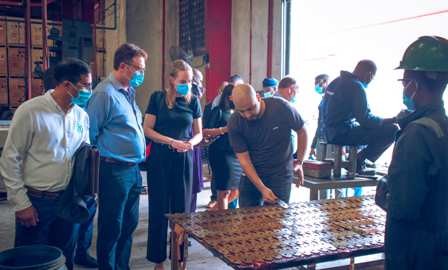In line with the developmental programs of the 2023-Nigeria Automotive Industry Development Plan geared towards enhancing automotive components Integration in the industry, the National Automotive Design and Development Council (NADDC) and the African Association of Automotive Manufacturers (AAAM) recently embarked on strategic familiarization tour of all the auto parts manufacturers in Nigeria.
The facilities visited on the first day of the tour in Lagos State include: Mikano Break Pads, Vita Parts Nigeria, Chanrai Nigeria Limited and Vita Visco Nigeria Ltd.
Aimed at strengthening relationships among Nigerian auto part manufacturers, the tour is basically targeted at fostering collaboration with the Original Equipment Manufacturers (OEMs) in promoting growth and development in the industry.
Speaking during the tour, the Director General, NADDC, Mr. Oluwemimo Joseph Osanipin stated that the aim of the visit was to focus on component parts manufacturers.
He said: “The first leg of the visit, whose aim was to assess the capacity of assembly plants is complete. The second phase focuses on enhancing the capabilities of components parts manufacturers.”
Accompanied by technical partners, Osanipin emphasized the vast aftermarket that abounds in Nigeria for auto parts.
Dave Coffey, the Chief Executive Officer of AAAM praised Mikano International Limited’s machinery quality, highlighting its potential for high product capacity. He emphasized the need for policy support to maximize production, aiming for 5-day, 3-shift operations.
Coffey identified an opportunity to localize production, reducing imports, particularly for aftermarket components.
He also suggested collaborating with NADDC to adjust duty structures and target specific products, leveraging Nigeria’s massive market.
According to him, AAAM works with African governments to develop and implement automotive policies and ecosystems.
Impressed by Mikano International Limited’s machinery quality and its high product capacity, Coffey advocated for policy support to maximize production and localization.
The AAAM helmsman, who identified aftermarket components as an opportunity for localization and job creation, suggested that collaboration with NADDC and duty structure adjustments can help achieve these goals.
Joseph Musa, Managing Director of VitaVisco Nigeria Limited, discussed the company’s struggles and aspirations. Established to supply automotive foam, VitaVisco faces low patronage, forcing them to explore alternative uses for their equipment.
Musa emphasized the need for government support and collaboration with the National Automotive Design and Development Council (NADDC) to revitalize the automotive foam sector. He highlighted the importance of working with Original Equipment Manufacturers (OEMs) to service the industry.
Musa identified key challenges facing the auto component manufacturers as Low patronage and lack of enabling environment
To this end, he solicited for government’s support and introduction of credit schemes to encourage local vehicle production and patronage.
Musa expressed optimism about the government’s potential initiatives to address these challenges, which would enable VitaVisco to serve the Nigerian market effectively.
He explained: “Although VitaVisco Nigeria Limited faces low patronage in the automotive foam sector, we are exploring alternative uses for our equipment. However, government initiatives, such as credit schemes shall encourage local vehicle production and benefit parts manufacturers.”.
As revealed by its Business Manager, Vita Parts Nigeria Limited is an indigenous manufacturer of oil filters, producing various ranges for Toyota, Honda, Suzuki, Kia, and Hyundai. They have two factories: a fabrication factory for raw materials and an assembly plant for finished products. Currently, raw materials are sourced from China due to local unavailability, but efforts are being made to source locally.
“Production capacity is 250,000 filters per day, with scalable lines. The factory has advanced testing equipment, ensuring compliance with Standard Organization of Nigeria (SON) standards. Vita Parts has a strong after-sales record, with no returns since production began in 2021” he said.
“Our filters have a capacity of 20,000 kilometers, surpassing the 3,000-5,000 kilometer range of most market filters.” he added.
©Copyright MOTORING WORLD INTERNATIONAL. All rights reserved. Materials, photographs, illustrations and other digital content on this website, may not be reproduced, published, broadcast, rewritten or redistributed in whole or in part without prior written permission from Motoring World International
Contact: editor@motoringworldng.com





